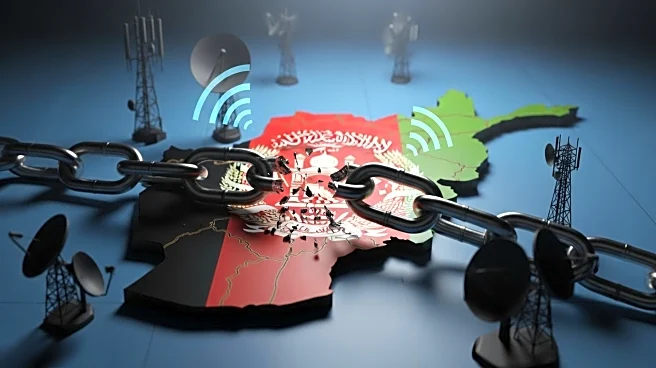What is the story about?
What's Happening?
The Taliban has enforced a nationwide internet blackout in Afghanistan, cutting off telecommunications and internet services across the country. This move follows weeks of restricted internet access, with the Taliban citing the need to prevent immoral activities as the reason for the shutdown. The blackout has affected multiple networks and telephone services, leading to a total connectivity blackout, according to internet watchdog Netblocks. The Taliban's leadership has not publicly commented on the blackout, but a local Taliban spokesperson stated that the ban was ordered by their leader to prevent immoral activities. This development comes amidst ongoing restrictions and crackdowns on women's rights, journalists, and public dissent since the Taliban regained power in 2021.
Why It's Important?
The internet blackout in Afghanistan has significant implications for the country's connectivity and access to information. It disrupts communication for millions of Afghans, affecting businesses, education, and access to global information. The shutdown is likely to exacerbate the isolation of Afghan citizens from the outside world, hindering their ability to engage in online education and business activities. The move also raises concerns about further restrictions on freedom of expression and access to information, as the Taliban continues to impose its interpretation of Islamic law. The blackout could have severe consequences for Afghanistan's economy and social fabric, as it limits the ability of citizens to connect with each other and the international community.
What's Next?
The Taliban has indicated that the telecom shutdown will last until further notice, leaving the duration of the blackout uncertain. The impact on banking and e-commerce systems nationwide is expected to be significant, as connectivity is crucial for these sectors. The international community may respond with increased scrutiny and pressure on the Taliban to restore internet access and uphold human rights. Afghan citizens and businesses will need to adapt to the new reality of limited connectivity, potentially seeking alternative means of communication and information access. The situation may also prompt discussions on the role of technology and internet access in promoting human rights and development in Afghanistan.
Beyond the Headlines
The internet blackout in Afghanistan highlights the broader issue of digital rights and access to information in conflict zones. It underscores the challenges faced by citizens living under regimes that restrict freedom of expression and access to technology. The situation raises ethical questions about the balance between security measures and individual rights, as well as the role of international organizations in advocating for digital rights. The long-term implications of the blackout could include increased efforts to develop alternative communication networks and technologies that bypass government restrictions. The event also serves as a reminder of the importance of global advocacy for internet freedom and the protection of human rights in the digital age.
















